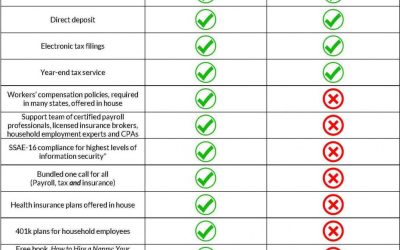The end of 2015 is only about 2 weeks away, so it’s important that everything is in order to ensure there are no surprises when it comes time to pay your nanny taxes next year. We recommend not putting off or ignoring your 2015 year end tax planning. It’s important to...
Blog Category:
Household Payroll & Taxes
2016 Minimum Wage Changes
Under the Fair Labor Standards Act (FLSA), employers – including household employers – in all states must pay their employees at least the state's minimum wage. This wage rate often changes at the beginning of a new year, so it's important for families with domestic...
Nanny Payroll Service Comparison
Only one firm takes care of all your household payroll, tax, and insurance obligation while providing superior customer service and support. No risk. No hassles. No worries. Please review the nanny payroll service comparison chart below. * - SSAE-16 is a...
Client Referral Incentive
Spread the word. Enjoy the perks! Do you know someone who would benefit from managing their household payroll, tax, and insurance obligations through GTM Payroll Services? We have a great new client referral incentive for you and your friend. Simply let us know about...
Benefits of Being Paid “On the Books”
Nannies and other household employees hold jobs like any other professional and should be paid legally to gain important protections and advantages. You will need to pay taxes but the benefits will far outweigh the small amount taken out of your paycheck. Here are...
Nanny Tax Threshold for 2016
The Social Security Administration (SSA) announced yesterday that the nanny tax threshold for 2016 will increase to $2,000, up from $1,900 this year. This affects all employers of domestic workers - if you pay your employee at least $2,000 in 2016, you are required to...
4 Key Reasons to Use a Nanny Payroll Service
There is more to paying your household employee than just cutting them a paycheck each week. Taxes need to be paid (by the employer and employee) and insurance coverage may need to be in place, just to start. The four key reasons to use a nanny payroll service are: 1....
IRS Publications for Homeowners
Here is a library of IRS publications for homeowners, covering many issues of concern. Title Publication Number Description Home Mortgage Interest Deduction 936 Includes general information on home mortgage interest, including points, how to report deductible interest...
Questions to Ask a Household Payroll Provider
A household employer must understand the federal, state, and local employment laws that pertain to his or her household. Many laws require the employer to obtain, file, and submit necessary paperwork. Tax laws also have paperwork requirements, such as reporting wages...
Sign up for our Newsletter
Household Employer Digest









 Get your free:
Get your free: